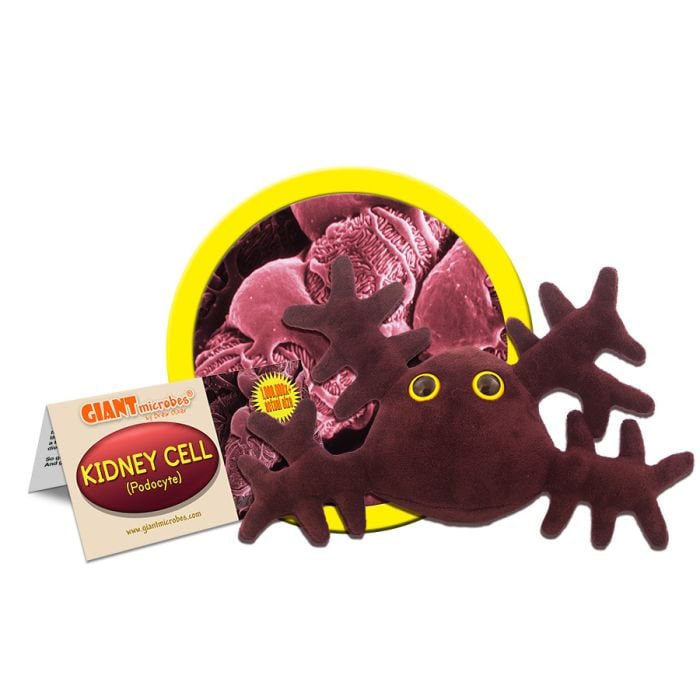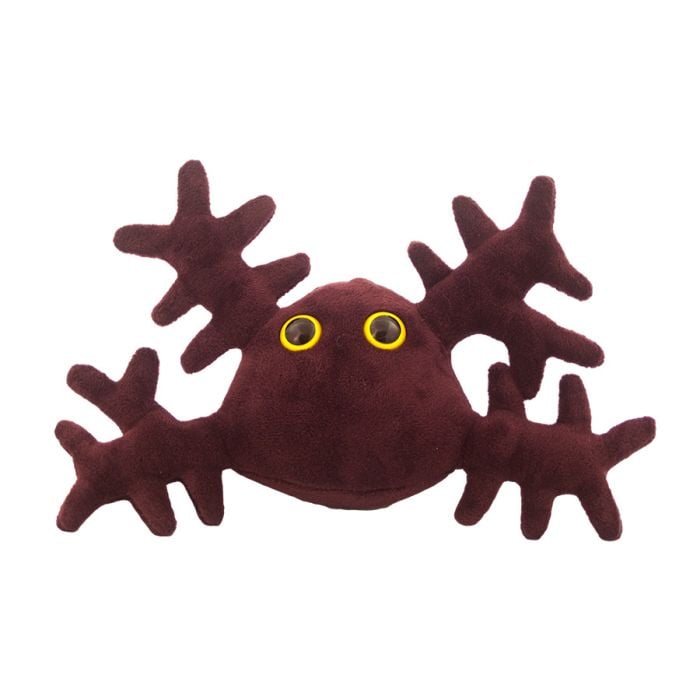Kidney Cell (Podocyte)
Out of Stock
Product Details
Additional Information
| Sizes | Giantmicrobes are based on actual microbes, cells, organisms and other critters, only 1,000,000 times actual size! Gigantic (GG) 16-24" XL (XL) 10-15" Original (PD) 5-8" Keychain (KC) 2-4" with clip |
|---|---|
| Materials | Plush from all new materials. Stuffed with polyester fiber fill. Surface washable: sponge with water & soap, air dry. |
| Packaging | Each plush microbe includes a printed card with fun, educational and fascinating facts about the actual microbe or cell. |
| Safety | Every product meets or exceeds U.S. and European standards for safety. For ages 3 and up. |
All about Kidney Cell (Podocyte)
FACTS: Your two kidneys are large filters within the urinary system. These fist-sized, bean-shaped organs perform many useful functions. Their main job is filtering blood to remove impurities and excess water. Over 1 liter of blood flows through the kidneys each minute!
Kidneys also release hormones and help the body maintain a proper balance of water, sodium and other chemicals. Each kidney contains up to a million tiny filtering units called nephrons. Inside each nephron are tubules and glomerulus.
Tubules collect urine. Glomerulus are tiny knots of blood vessels that filter waste from the bloodstream. As blood flows through the glomerulus, water and molecules pass through the sieve into the renal tubule. Useful chemicals are reabsorbed, and the rest are sent to the bladder as urine. While you may not like cleaning chores yourself, you should thank your kidneys. Every day they may clean over 400 gallons (1500 liters) of blood!
| Description | Together, the body’s two kidneys work to remove waste and extra fluid, control blood pressure, and filter toxins out of the body. Through this filtering, they are the ultimate controllers of the body’s pH levels. |
|---|
| Name |
Most kidney related functions, diseases, and body parts have either the prefix “nephro” or “rene”. For example, the renal artery brings blood to the kidneys and nephrosis is the general term for kidney disease. The nephron, which is Greek for kidney, is the basic structural and functional unit of this organ. There are nearly ten different types of kidney cells. A few important ones are the podocyte, which wraps around capillaries that filter blood, and the collecting duct intercalated cells which help maintain electrolyte and fluid balance. |
|---|
| Actual Size | About 20 microns. |
|---|
| System | Urinary and endocrine systems. |
|---|
| History | The bible mentions the kidneys in several verses in conjunction with the heart. In ancient India, it was believed that the kidneys were the beginning of all excursion channels and received from all other systems. This organ was associated with health and even moral decisions. From the 1500s until modern day times, different features of the kidney and cell types have slowly been identified and labeled. Many of these discoveries took place in Eastern Europe. |
|---|
| Fascinating Facts |
In ancient times, people sacrificed the kidneys of their goats, sheep, and cattle as an “offering to God". Exactly half of one single kidney is capable of doing the job that is performed by two kidneys together.. All the blood in the body gets filtered through the kidneys around 400 times per day. |
|---|





